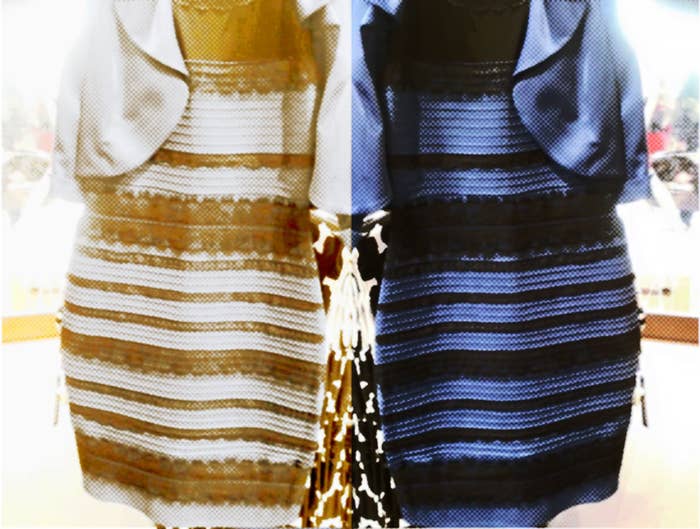
BuzzFeed sprouted from the depths of web culture, and began its life as a place to find delightful things on the internet. The explosion of Cates Holderness' post about The Dress (white and gold, by the way) is a reminder that while we now do so many more things, we've never moved away from our roots. Indeed, we launched the Cute or Not app yesterday.
What has happened instead is that the world has moved toward us. What might, a few years ago, have been a web culture phenomenon is today a cultural phenomenon, and the distinction between the two isn't really intelligible. Last night, we talked to each other on Twitter and also handed phones around in bars and bedrooms. Mindy Kaling's writers fought about it, Kim and Kanye disagreed, and Taylor Swift was wittily confused. The president of Estonia also weighed in. And we covered it as a web phenomenon and a piece of fabric in the world. First Cates shared the image itself, and as it became news, Claudia Koerner in Los Angeles and Ryan Broderick in London got the story behind it; Brian Galindo and Kristin Chirico found it online; and Ginny Hughes roused a couple of neurologists to explain the cognitive workings behind the different perceptions of the dress.
Some of the muscles we used in our, er, comprehensive dress coverage were the ones we've had for years; others, like rigorous science writing, were very new ones. And indeed, we have many new muscles at BuzzFeed. BuzzFeed News has dispatches up today from Mike Giglio in Kirkuk, Iraq; Sheera Frenkel in Jerusalem; and Karla Zabludovsky in Durango, Mexico; in the last several days we've published Aram Roston's searing exposé of for-profit foster care and Joel Anderson's rich profile of a revered black icon's risky presidential campaign; onstage at CPAC today, Sean Hannity asked Jeb Bush about McKay Coppins' story on his LGBT views. These, too, are all part of a culture and conversation that lives on the web, and they benefit from the roots and distribution and tools that grew with us out of the web.
They also share with Cates' post something more abstract about how we think about content: We are interested most of all in what a story does — not just in how many people read it, but in what effect it has on their lives and on the world. Cates' post delighted people and connected them. To steal an idea from Ze Frank, its power was less in the encapsulated item itself than in the network around it. That's true of a brilliant piece of entertainment; it's true of a recipe or a DIY suggestion; and it's true of a news article that forces the resignation of an allegedly corrupt official or changes a government policy.
And finally, I'm so glad that Cates is the new wearer of the golden BuzzFeed crown (which, in point of fact, Kaye Toal made for her this morning). Cates predates me slightly at BuzzFeed, and started here as a community user who loved animals and loved the internet. She embodies a key element of the spirit that we've always had: She lives inside the internet and loves the internet without any cynicism or any particular illusion about it.
So thank you, Cates, for following a tip from a BuzzFeed Tumblr follower to The Dress.
Thanks are due too to our tech team for keeping the site up — Cates' post alone has had more than 28 million views so far, 79% from mobile and 94% from social sources — so I could spend last night arguing with my kids about The Dress. And thanks, of course, to the many writers who were up late and early with smart and creative angles (some of which we've adapted into Spanish, French, Portuguese, and German) — among them, Katie Notopoulos' devastating smackdown of the delusional white-and-golders; Ginny's exploration of how autistic people see themselves in this moment; and Daniel Dalton's coda to the whole strange and wonderful affair.
